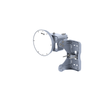
Revolutionising Access Control Systems with AI for Enhanced Convenience and Efficiency
- Blog
- 17 May, 2023
Revolutionising Access Control Systems with AI for Enhanced Convenience and Efficiency
In the world of access control systems, security has traditionally come at the cost of convenience and efficiency. However, with the advent of artificial intelligence (AI), security managers can now envision a future where enhanced security seamlessly integrates with easy operation and usability. AI has the potential to transform access control systems, offering increased convenience, efficiency, and safety.
The Power of AI in Access Control
By leveraging large-scale data sets, AI can effectively identify and monitor specific areas prone to errors, rather than subjecting the entire system to exhaustive scrutiny. AI can also predict potential issues by detecting early signs of anomalous behaviour, allowing for proactive security measures without compromising convenience and efficiency.
The Role of Accurate Access and Behavior Data
Obtaining accurate access and behaviour data has been a challenge with existing access control systems. However, real-time location systems (RTLS) equipped with technologies like ultra-wideband (UWB) can provide precise access and movement information. Integrating UWB-enabled mobile credentials with access control systems enables the collection of high-quality data necessary for training AI algorithms.
The Future Outlook
With advancements in RTLS technologies and the integration of UWB with access control systems, the market will witness a range of RTLS-enabled solutions with location intelligence capabilities. These systems will empower security managers by accurately predicting potential problems based on precise entering and exiting data, effectively preventing issues before they occur.
The 4th Industrial Revolution
The ongoing 4th Industrial Revolution is marked by the transformation of value creation. AI, fueled by vast amounts of data, surpasses human capabilities and enables cloud-based services to deliver unprecedented value. This revolution drives the dedication of Suprema developers and the industry as a whole towards harnessing AI to improve the convenience and efficiency of cloud-based access control offerings.

Conclusion
Artificial intelligence is reshaping the access control industry, enabling security managers to achieve enhanced security without sacrificing convenience and efficiency. With AI-powered systems capable of predicting and preventing issues, the future of access control is poised to deliver a seamless and secure experience for all stakeholders. Embracing the power of AI, the industry is moving towards a new era of intelligent and intuitive access control solutions.





















